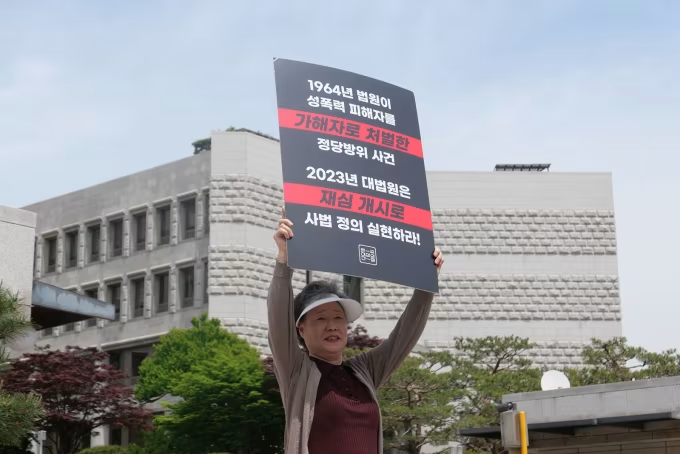South Korea overturns the 60-year-old conviction of elderly woman who was jailed for biting an alleged attacker’s tongue
A South Korean court has finally overturned the decades-old conviction of Choi Mal-ja, a woman who spent much of her life fighting to clear her name after being punished for defending herself against sexual assault as a teenager.
Now 79, Choi was just 18 years old in 1964 when she said she was attacked in Busan by a man who had asked her for directions.
To escape, she bit off 1.5 centimeters (0.6 inches) of his tongue. Instead of being recognized as a victim, she was charged with grievous bodily harm after the man sued her. She in turn filed charges of attempted rape, intimidation, and trespassing against him.
But in South Korea of the 1960s, a country still recovering from war and bound by a rigidly patriarchal culture, the system worked against her.
Choi was sentenced to 10 months in prison and two years of probation, while her attacker received just six months in prison and a year of probation. The attempted rape charge against him was dropped entirely.
For years Choi lived with that judgment, until women’s rights movements like #MeToo gave her the push to seek justice once again.
Since 2020, she has pursued a retrial, and on Wednesday the Busan District Court declared her innocent.
The judges found there was no proof that her assailant suffered lasting damage. Medical records revealed he had tongue surgery, passed his military fitness exams, and even served in the military.
A witness testified that his speech returned to normal within a year. The court further ruled Choi had acted in self-defense, “to protect herself from unlawful assault.”
The acquittal was met with celebration outside the court, where supporters waved signs, handed her flowers, and chanted, “Choi Mal-ja did it!” Videos captured the emotional moment as Choi, grey-haired but resolute, stood before them.
“People warned me, saying it would be like hitting an egg against a rock, but I couldn’t just let this case be buried,” she told JTBC.
Her lawyers now intend to sue the South Korean government for damages.
The retrial also highlighted the injustices of her original case. Choi has said her rights were trampled during the investigation, recalling how she was handcuffed, forced to undergo a virginity test, and humiliated when the results were made public.
She and her supporters also allege prosecutors and judges asked if she would marry her assailant to settle the matter, suggesting it could “make amends” for his injuries since “no other woman would want to marry a man with half a tongue.”
Reflecting on the old ruling, Wang Mi-yang, president of the Korea Women Lawyers Association, noted it stemmed from “social prejudice and distorted views on victims of sexual violence that remained deeply rooted in our society.” He added: “The social atmosphere of the time probably had the prosecutors siding with the man, and I believe the concept of sexual violence likely didn’t exist.”
In the decades since, movements against sexual violence have gained ground in South Korea, from the 1990s campaigns for “comfort women” to the sweeping #MeToo wave in 2018.
Those shifts in social attitudes gave Choi the courage to pursue her fight.
“The girl’s life, which couldn’t even blossom, was forever unfair and in resentment… the country must compensate for my human rights,” she wrote to the Supreme Court in a letter seeking retrial.
